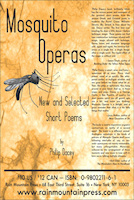nycBigCityLit.com the rivers of it, abridged


Reviews
Mosquito Operas: New and Selected Short Poems
by Philip Dacey

MOSQUITO OPERAS:
NEW AND SELECTED SHORT POEMS
by Philip Dacey
Rain Mountain Press, 2010; 74 pages; $10.00
ISBN 0-9802211-6-1, paperback
Rain Mountain Press
Reviewed by Jared Smith
A key to fully experiencing this magnificent collection of short poems is that they are not short but multidimensional openings into a complex vision. They are poems of many forms, often flailing and flying erratically and organically, while blessedly lacking traditional linear form and extending far beyond where their physical presence lies. Oh, the traditional formalist will find here sonnets and triolets and Haikus, but such forms can be found in countless books. What makes this collection so enjoyable and rewarding is that these are mosquito operas…they are hardly visible openings into the evening shadows of our universe, carried on translucent wings and quivering self-sustained notes that hook into our fears and delights. And once read they are ever-present, crawling out and taking flight from the everyday experiences of our lives—without fanfare, rising from what surrounds us when the lights are out. They are openings into the apparently trivial, which is in fact at the heart of both our physical and social existence:
The mosquito auditions
for a tiny
Grand opera,
Complete with bloodshed…
The deer's leap. The very arc
of the soul crossing
from one world to another.
—from PASTORAL TAKES: Lynd, Minnesota
The word "Grand" in discussion of these mosquito operas is important. It emphasizes how each small set of words, each vision laid out in sound and image within each "short" poem, is in fact part of a larger or grander vision and understanding that can be communicated only through multidimensional and multisensual experience. So these poems may be ignited initially by listening to classical music, or by a first game of bowling with the author's son, but always—even before the technique of laying the poem down on paper, the transformation happens into that grander vision:
The first time ever bowling
he does a little dance—
before technique, magic.
—from TEN PINS
And in this transformation, which happens spontaneously from contemplation or participation in sex or politics or fatherhood or the music that fascinates, gnaws at, and infuriates the poet, springs the distance between close objects and the smallness of space that separates close objects. Each poem takes on added depth not only from its linear examination under the cold light of day, but from that which surrounds it in other lights and in other realms of sound:
Write each poem twice,
once in sunlight,
once in moonlight….
Who can write a poem about
blossoms falling in the wind
and mean only
blossoms falling in the wind?
—-from NOTES OF AN ANCIENT CHINESE POET
Who indeed? And if one were to write a poem that was only what it seemed and could be put in simpler words, why bother? And if one were to write a poem that had experience only within a classroom or only within the confines of one bedroom, or were impervious to the pain and hysterics and blood of the world we live in, and in which our senses and our intellect live in, then what would be the point?
Philip Dacey writes always with a vision, and in that vision there is always a point, a meaning, an existence we cannot touch without poetry, but which is vital to all the most mundane of things with which we struggle and impose upon ourselves and upon others…sounds and thoughts that are of our brightest and our very darkest nature and which sometimes wind those two diverse aspects of our nature together in ways we cannot bear to listen to, but must. Let me close with some lines Philip Dacey wrote with reference to the oldest Secretary of Defense this country ever employed in its warfare machinations, who was also the youngest Secretary of Defense who ever served in that function, and who has probably done more to shape our modern military than any other single man. These lines were written by Dacey to experience and reflect upon a National Public Radio reporter's comments comparing Donald Rumsfeld's memos on war to snowflakes. The poem I take them from is SNOWFLAKES:
First they eat holes
into leather boots.
Snowballs
that tick.
The pipe stuck
in the snowman's mouth
swivels like a gun in a turret…
Mosquitoes are highly annoying, carry painfully disabling and fatal diseases that can circulate in our blood for years, killing us slowly. And they are prime players in the food chain. This book belongs on your shelf, in an honored and uneasy place.
Jared Smith's 9th book of poetry, Grassroots, was published by Wind Publications this summer. Looking Into the Machinery: The Selected Longer Poems of Jared Smith was published last April by Tamarack Editions. His poems, essays, and literary commentary have appeared in hundreds of journals in this country and abroad over the past 30 years.